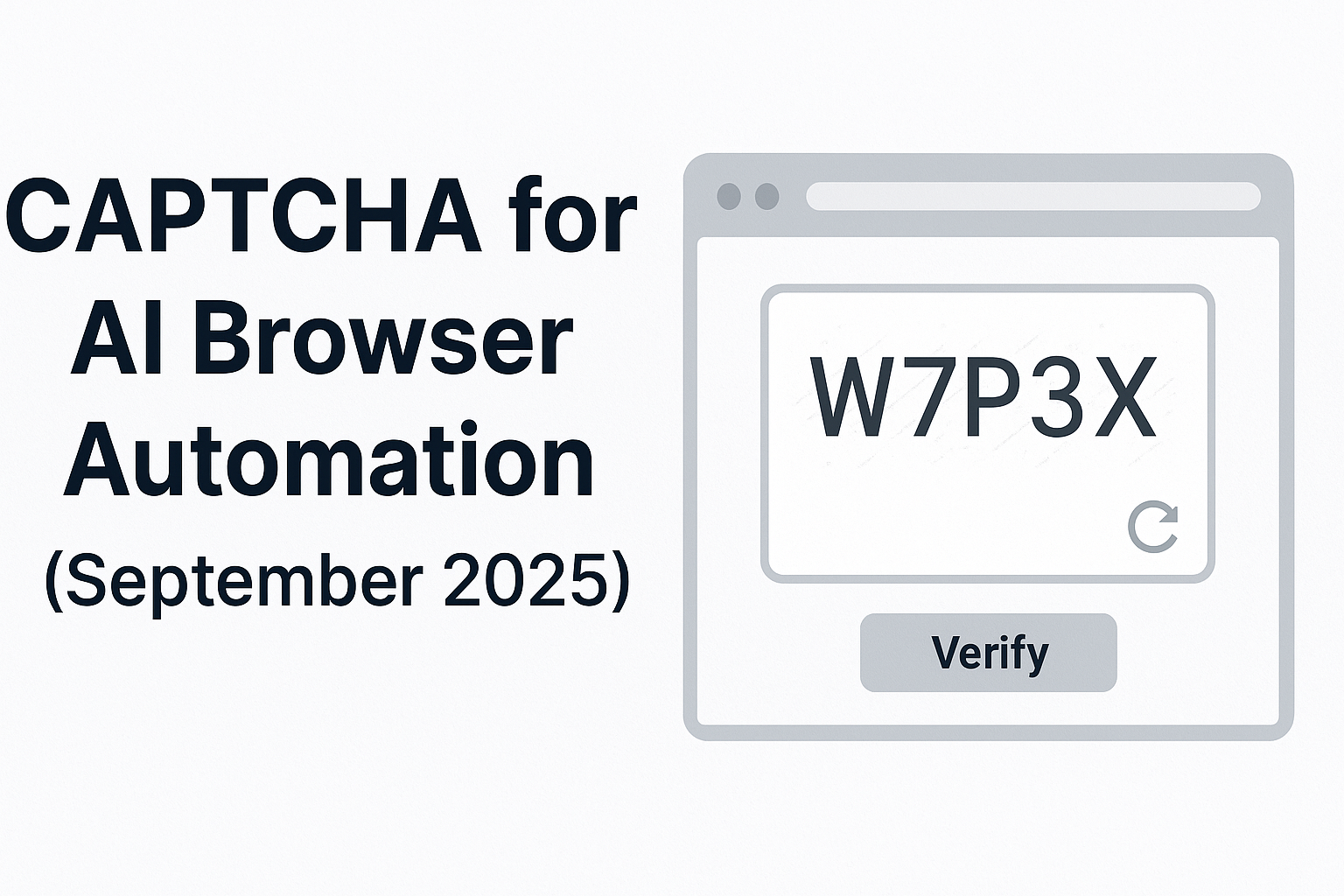Best Way to Bypass CAPTCHA for AI Browser Automation (September 2025)

Getting your automation workflows to run reliably means solving the CAPTCHA problem once and for all. Most teams end up cobbling together multiple services, dealing with inconsistent success rates, or watching their scripts fail when they hit sophisticated bot detection. Modern AI browser automation platforms now handle CAPTCHA solving natively, but standalone services and stealth plugins each take different approaches with wildly different results. Let's hop into the four main methods for bypassing CAPTCHAs in 2025 and how they actually perform in production environments.
TLDR:
- Integrated platforms like Skyvern offer the most reliable CAPTCHA bypass for production automation workflows
- Human-powered services like Anti-Captcha provide high accuracy but create scalability bottlenecks
- AI-only solutions like CapSolver work well for standard image CAPTCHAs but struggle with complex implementations
- Stealth plugins are largely ineffective against modern CAPTCHA systems in 2025
- Success rates vary dramatically: integrated solutions achieve 85%+, while basic stealth approaches drop to 40-60%
What Are CAPTCHAs and Why Do They Block AI Browser Automation
CAPTCHAs (Completely Automated Public Turing tests to tell Computers and Humans Apart) are challenge-response tests designed to distinguish humans from automated bots. They serve as digital bouncers, blocking spam, automated abuse, and malicious online behavior.
Modern CAPTCHAs have evolved far beyond simple text recognition. Today's implementations include image-based tests requiring object identification in grids, audio challenges where users transcribe spoken content, and puzzle challenges involving sliding pieces into place. These systems target the behavioral patterns and technical signatures that automated tools exhibit.
For browser automation platforms, CAPTCHAs represent a major obstacle, naturally. Traditional tools like Selenium, Puppeteer, and Playwright struggle because they rely on predictable, programmatic interactions that CAPTCHA systems are designed to detect. The challenge becomes even more complex when dealing with adaptive systems that adjust difficulty based on perceived bot behavior.
CAPTCHAs in 2025 are sophisticated AI-detection systems that can shut down entire automation workflows if not properly handled.

The impact extends beyond simple inconvenience. Failed CAPTCHA handling can cascade through multi-step workflows, causing data collection failures, incomplete form submissions, and broken authentication processes. This is why modern automation platforms increasingly integrate CAPTCHA solving as a core feature rather than treating it as an afterthought.
How We Tested CAPTCHA Bypass Methods
Our evaluation methodology focuses on real-world effectiveness rather than theoretical features. We tested each solution across different CAPTCHA types, integration scenarios, and production environments to understand their practical limitations and strengths.
We assessed reliability across major CAPTCHA implementations including reCAPTCHA v2, reCAPTCHA v3, hCaptcha, and custom enterprise solutions. Integration complexity measured how easily each solution works with existing automation frameworks like Selenium, Playwright, and Puppeteer. Cost analysis included both direct service fees and hidden costs like development time and maintenance overhead.
Success rates were measured in production environments rather than controlled testing scenarios. This approach revealed major differences between advertised features and real-world performance, particularly when dealing with sophisticated anti-bot systems.
The comparison focuses on solutions that work smoothly with existing automation workflows while providing consistent results at scale. We tested how each method handles edge cases like mobile CAPTCHAs, multi-language implementations, and adaptive difficulty systems.
1. Best Overall: Skyvern
Skyvern automates browser-based workflows using LLMs and computer vision, providing a simple API endpoint to fully automate manual workflows across websites without requiring customized code for each implementation.
Unlike standalone CAPTCHA solvers, Skyvern Cloud comes bundled with anti-bot detection mechanisms, proxy networks, and integrated CAPTCHA solving features. This complete approach removes the complexity of managing multiple services while maintaining consistent performance across different websites and CAPTCHA types.
Key strengths include built-in CAPTCHA solving integrated with AI browser automation, native support for complex workflows including authentication and multi-step processes, resistance to website changes using computer vision instead of brittle selectors, and enterprise-grade proxy networks with geographic targeting features.
Skyvern handles CAPTCHAs automatically as part of complete workflow automation. When your automation encounters a CAPTCHA, the platform switches to its solving mechanisms without breaking the workflow flow. This integrated approach proves especially valuable for complex processes involving form filling, authentication, and file downloads.
The platform's LLM-powered approach means it can adapt to new CAPTCHA implementations without requiring code updates. This flexibility becomes important as CAPTCHA systems evolve and traditional automation tools become obsolete.
Bottom line: Best integrated solution for production AI browser automation requiring reliable CAPTCHA handling.

2. Human Network Dependent: Anti-Captcha
Anti-Captcha operates a 24/7/365 CAPTCHA bypass service powered entirely by human workers distributed globally. Their approach achieves high accuracy rates by using human intelligence rather than automated recognition systems.
The service supports all major CAPTCHA types including custom enterprise implementations that often stump AI-powered solutions. Their human workforce can handle visual puzzles, audio challenges, and complex multi-step verification processes that require contextual understanding.
Key strengths include exceptionally high accuracy rates for complex CAPTCHAs through human solving, support for all CAPTCHA types including custom implementations, and reliable 24/7 availability through their global workforce.
However, this human-dependent approach creates inherent limitations. Processing times depend on worker availability, costs scale directly with volume, and the service becomes a potential bottleneck for high-speed automation workflows. During peak hours or holidays, response times can increase substantially.
The service works well for moderate-volume automation where accuracy matters more than speed. For purchasing workflows or sensitive data collection, the human element provides reliability that AI systems sometimes lack.
Bottom line: Highly accurate but dependent on human workforce availability and processing times.

3. AI Recognition Limited: CapSolver
CapSolver provides AI-powered CAPTCHA solving through machine learning algorithms designed to recognize and solve image-based challenges. Their browser extension automatically handles CAPTCHAs in the background using artificial intelligence.
The service focuses on speed and automation, processing CAPTCHAs faster than human-powered alternatives. CapSolver integrates with major automation frameworks and provides APIs for custom implementations.
Key strengths include AI-powered recognition for faster processing than human services, browser extension for easy integration with existing workflows, and competitive pricing for high-volume operations.
Performance varies greatly based on CAPTCHA complexity. Standard image recognition CAPTCHAs achieve good success rates, but more sophisticated implementations like reCAPTCHA v3 or adaptive systems present challenges. The AI approach struggles with context-dependent puzzles that require human-like reasoning.
CapSolver works best for straightforward automation scenarios involving standard CAPTCHA implementations. For complex government workflows or enterprise systems with custom CAPTCHAs, the limitations become more apparent.
Bottom line: Effective for standard image CAPTCHAs but limited effectiveness against sophisticated implementations.
4. Development-Only Tool: Stealth Plugins
Stealth plugins like puppeteer-extra-plugin-stealth and Selenium Stealth attempt to bypass CAPTCHAs by masking automation signatures rather than solving them directly. These tools modify browser behavior to appear more human-like.
The approach involves hiding automation indicators, spoofing user agent strings, and mimicking human interaction patterns. Popular implementations include puppeteer-extra for Puppeteer and undetected-chromedriver for Selenium.
Key strengths include free and open-source availability, direct integration with existing automation frameworks, and no per-CAPTCHA costs for high-volume operations.
However, effectiveness has declined greatly as CAPTCHA systems have evolved. Modern implementations like Cloudflare's bot detection and reCAPTCHA v3 use advanced behavioral analysis that stealth plugins cannot adequately mask. Success rates against current CAPTCHA systems often fall below 50%.
These plugins work only against basic anti-bot measures. When dealing with enterprise-grade protection systems, they provide minimal value and can actually trigger more aggressive CAPTCHA challenges.
Bottom line: Limited effectiveness against modern CAPTCHA systems and largely obsolete for production use.
Feature Comparison Matrix
Feature | Skyvern | Anti-Captcha | CapSolver | Stealth Plugins |
|---|---|---|---|---|
AI Integration | ✅ Native | ❌ External | ✅ Built-in | ✅ Framework |
Human Workers | ✅ Hybrid | ✅ Primary | ❌ AI Only | ❌ Prevention |
Success Rate | 85%+ | 95%+ | 80-90% | 40-60% |
Cost per 1K | $1-2 | $2-3 | $1-2 | Free |
Setup Complexity | Low | Medium | Medium | High |
Multi-step Workflows | ✅ Native | ❌ Manual | ❌ Manual | ❌ Basic |
Enterprise Support | ✅ Full | ✅ API | ✅ API | ❌ Community |
How to Choose the Best CAPTCHA Bypass Solution
The right CAPTCHA bypass method depends on your specific automation needs, technical requirements, and business constraints. Consider your workflow complexity first when reviewing options.
For simple scraping scripts with basic CAPTCHA encounters, external services like Anti-Captcha or CapSolver may provide adequate functionality. However, complex multi-step automation involving authentication, form filling, and file downloads benefits greatly from integrated platforms that handle CAPTCHA solving as part of broader workflow automation.
Scale requirements play an important role in solution selection. High-volume operations need reliable, fast-processing solutions that won't become bottlenecks. CAPTCHA-solving features should integrate smoothly with your existing automation infrastructure, operate continuously without human intervention, and scale operations by automating entire processes end-to-end.
Budget considerations extend beyond simple per-CAPTCHA costs. While free approaches like stealth plugins might seem attractive initially, their poor success rates against modern CAPTCHA systems often result in higher total costs through failed automation runs and increased development time.
What Success Rates Really Mean
Success rates vary dramatically based on CAPTCHA complexity and implementation sophistication. Basic image CAPTCHAs might achieve 90%+ success with AI solutions, while adaptive systems like reCAPTCHA v3 can drop success rates to 60% or lower for the same tools.
Consider maintenance overhead carefully. Solutions requiring custom integration and ongoing updates demand major developer resources. Platforms offering complete automation with built-in CAPTCHA handling reduce technical burden while providing more consistent results across different websites and CAPTCHA implementations.
For job application automation or other sensitive workflows, reliability matters more than cost savings. Failed CAPTCHA handling can result in missed opportunities or incomplete processes that cost more than premium solving services.
Frequently Asked Questions
What's the most reliable CAPTCHA bypass method for production automation?
Integrated platforms like Skyvern provide the highest reliability for production environments because they combine CAPTCHA solving with complete workflow automation. This approach eliminates integration complexity while maintaining consistent performance across different websites and CAPTCHA types.
How much do CAPTCHA solving services typically cost?
Costs range from $1-3 per 1,000 solved CAPTCHAs for most commercial services. However, total cost includes integration time, maintenance overhead, and failed automation costs. Free solutions often result in higher total costs due to poor success rates and development complexity.
Can AI completely replace human CAPTCHA solvers?
Current AI solutions handle standard image CAPTCHAs effectively but struggle with complex, context-dependent challenges. Hybrid approaches combining AI speed with human accuracy for difficult cases provide the best balance of performance and reliability.
Do stealth plugins still work against modern CAPTCHAs?
Stealth plugins have become largely ineffective against sophisticated CAPTCHA systems in 2025. Modern implementations use behavioral analysis and advanced detection methods that simple automation masking cannot bypass reliably.
How do I integrate CAPTCHA solving with existing automation scripts?
Integration complexity varies by solution. External services require API integration and error handling logic, while platforms like Skyvern provide native integration features that work smoothly with existing automation workflows without requiring major code changes.
Final thoughts on CAPTCHA bypass for browser automation
You can eliminate CAPTCHA roadblocks with the right automation approach. Modern AI browser automation like Skyvern handles CAPTCHA solving natively while automating your entire workflow. This removes the complexity of managing multiple services and delivers reliable results at scale.

